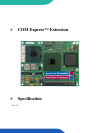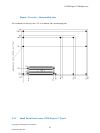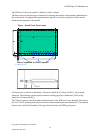
2 Introduction
Copyright © COM Express™ Extension
Specification Rev 013
6
2 Introduction
2.1 COM Express™ Extension Specification
The COM Express™ Extension Specification builds on the COM Express™ (COM.0) standard as
defined by the PCI Industrial Computer Manufacturers’ Group (PICMG®) which is an industry
standard adopted for Computer-On-Modules. The COM Express™ Extension Specification is focused
with its intellectual properties on the deep embedded market and is intended to be an add-on to the
PICMG’s COM Express™ COM.0 Specification. It is the intention of the authors of this specification
to propose the information contained here within to PICMG® as a means of updating the current
COM Express™ standard to ensure continued saleability and compatibility of all COM Express™
solutions.
2.2 COM Express™ Extension Design Guide
The COM Express™ Design Guide, a separate document from both the PICMG® COM Express™
Specification and this COM Express™ Extension Specification, is available to COM Express™ module
customers upon request. For download the COM Express™ Extension Design guide please visit our
web page:
http://www.comexpress-extension.com/specs/specs.php
The COM Express™ Design Guide explores the requirements of the COM Express™ Extension
Specification and provides recommendations on designing COM Express™ baseboards to support
various features of COM Express™ compliant modules.
The COM Express™ Design Guide, based upon the COM Express™ Extension Specification and
PICMG® COM Express™ Specification, discusses capabilities in the specification with schematic
examples where applicable and offers ideas to consider for maximum flexibility in designing
baseboards.
2.3 COM Express™ Computer-On-Module
A COM Express™ Computer-On-Module (COM) is a module with all components necessary for a
bootable host computer, packaged as a super component. COMs require a carrier board in order to
bring out I/O and to power up the CPU module.
COMs are used to build single board computer solutions and offer OEMs fast time-to-market with
reduced development cost.
Like integrated circuits, they provide OEMs with significant freedom when working to meet form-fit-
function requirements. For all of these reasons, COM methodology has gained significant popularity
with OEMs in the embedded industry. The COM Express™ standard is designed to be future proof
and to provide a smooth transition path from legacy parallel interfaces to LVDS (Low Voltage


















